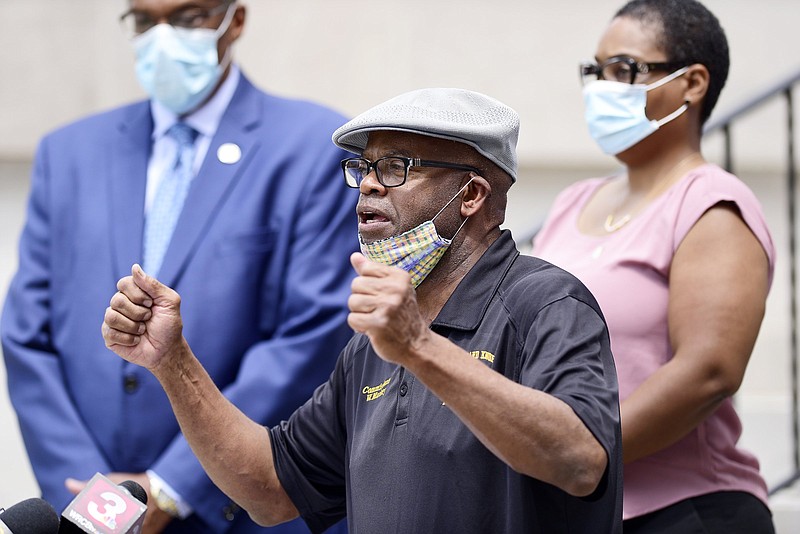Are you kidding?
We can't imagine anything more tone-deaf today when a pandemic has wrecked the economy than suggesting a $100,000 discretionary fund for each Hamilton County commissioner to dispense as he or she pleases.
Discretionary funds are like "The Monster That Wouldn't Die" from a 1950s "B" movie. Just when you think it's dead, it comes back to life.
The resolution is expected to be voted on next week.
"I've got to believe that I'm not the only commissioner who has poor people and needy people in their district," Mackey said, "and this money is designed to help bring support to them."
In these hyper-political, hyper-racial days, in which the COVID-19 virus hangs over our collective heads, we see what a turn this argument easily could take.
Commissioners who don't support this resolution would be labeled as racist, anti-poor and anti-needy. And if they don't earmark their funds for projects benefiting minority communities, they would be similarly tagged.
But that's not why we don't think returning to discretionary funds is a good idea.
Any spending of discretionary funds, worthy as that expense might be, looks as if it is a vote-buying scheme. What could be a bigger candidate enhancement, for instance, than the commissioner who buys band instruments for a school or funds the volunteer fire department or buys a table at the annual Benevolent and Protective Order of the Elks banquet?
In an election year, the incumbent candidates who can say they paid for an upgrade to the football fieldhouse or a scoreboard for the softball field or computer upgrades at the community center have an automatic advantage over the most earnest challenger who has nothing similar to offer.
And then there's the world in which we find ourselves in 2020. Stay-at-home orders earlier this year threw millions out of work, causing spending to decline and, thus, tax collections to fall. And while some have returned to work, tax collection is unlikely to return to pre-pandemic levels for several years. That leaves both state and local coffers lower than they would have been.
Last month, the county adopted a fiscal 2021 budget that projected no growth in local funding.
"This has been a difficult financial year, due to the challenges we have faced," Mayor Jim Coppinger said after the commission unanimously passed a $796.6 billion budget late last month. "My goal this year is to maintain service with our current fiscal constraints while meeting all maintenance of effort requirements and not raise property taxes."
He said county employees would not be getting raises, that numerous requests for additional funding were denied and that $29.5 million in requested funds were cut.
Mackey, at the time, seemed to understand the financial predicament in which the global pandemic had put the nation, state and county.
"Listening to the other commissioners, they too realize we are in troubled times," he said. "I think y'all have your thumb on the pulse of the people, y'all are on the right track and you're being realistic in terms of what we can do."
Three weeks later, Mackey revived the discretionary funds issue.
It is not clear from where the discretionary funds would come, but one would guess from county reserve funds. It is from there that the county commission plucked discretionary funds for fiscal 2016 after Coppinger removed them from the budget. The commission added them back to the budget and eventually overrode the county mayor's veto of the budget to retain them.
No such grab was made for fiscal 2017, though efforts have been made to revive the funds since. Then, in lieu of discretionary funds, commissioners employed their unused travel funds for discretionary purposes while other county constitutional offices returned their unused money to the county general fund.
However, in January, Commissioner Greg Martin suggested the commission do as the other constitutional offices and return the unused travel money to the general fund. In a vote in February, the measure passed 8-1, with only Mackey voting against it.
Although we believe most of the discretionary funds spent over the years went to worthy projects, the number of worthy projects that could be funded vastly outnumber the ones that were. If a project is so worthy it needs to be funded annually, it should be considered at budget time - in public - with all other such projects. And if the need is so overriding that it needs funding immediately, it should be brought - in public - before the commission.
"Hopefully," Coppinger said, "the discretionary money doesn't happen, speaking as the fiscal agent of this county."
Giving commissioners a fund to use at their discretion is as wrong today - and especially today - as it was when the county mayor removed it from the budget in 2015.
